Hello Steemit friends!
Today I invite you to take a brief tour by our past, and as usual, I will leave my conclusions so that you can draw yours.
Summary:
- Introduction
- Muslim Spain
- Arab heritage in Spain
- Formation of the Spanish Empire
- Reign of Ferdinand II of Aragon and Isabel I of Castile
- Conclusions
- Introduction:
Since ancient times greed has already manifested itself as an important part of human behavior.
Each continent and every corner of the Earth has its own history. While in Europe they fought for centuries to dominate large territories, in America, large and diverse communities of aborigines, with different cultures and level of development, tried to live in society in a peaceful way.
In the world we live in, we are as diverse as the number of living beings we inhabit it. But today I will focus on making a summary of the part of history that preceded the so-called discovery of America, in what concerns basically Spain and Cuba, as these are the two countries where I have lived most of my life.
Let's start the trip:
- Muslim Spain
The Muslim conquest of Spain can be summarized in a brief chronology:
Year 696: the city of Melilla is conquered by the Omeya caliphate.
Year 709: the city of Ceuta is conquered by the Umayyad caliphate.
Year 711: After the death of King Witiza, the nobles and bishops of the peninsula choose Roderico as king (known in history by Don Rodrigo), Duke of Betica. The sons of Witiza wanted Aquila, Duke of Tarraconense, as king, for what they agreed with the Arabs through Don Julian, Count of Ceuta.
Year 773: the city of Córdoba is proclaimed emirate and in 929 it is proclaimed caliphate
There was a significant increase in the interest of Muslims in the peninsula around the year 1000 as a result of the looting of the city of Barcelona, as well as other Christian cities. The Muslims not only wanted to expand through the territory but to impose their culture and religion.
Finally in 1212 the beginning of the end began: the gigantic battle of Las Navas de Tolosa took place. After this battle the Muslim kingdoms in Spain began to weaken.
Then comes the medieval stage, where Spain becomes the scene of constant wars between Muslims and Christians.
By 1492 only the emirate of Granada had survived, this being the only independent Muslim kingdom in Spain.
By this time the almost 800 years of Arab presence in the peninsula had already left their mark. It is impossible to fail to mention the effects that this domain had in the long term on technology, culture and Spanish society.
- Arab heritage in Spain, examples:
Cultural innovations: alchemy, algebra, chess, the use of Arabic numerals to replace Roman numerals, the idea of zero, or Aristotelian philosophy, which had been lost to the rest of Europe.
Music: the Muslim presence provides instruments and melodies that would later give way to the guitar and flamenco.
The chickpea: legume little known in Europe and yet is part of the most traditional Spanish meals.

Arabic words in Spanish (in some cases I will put in parenthesis the corresponding term of Latin origin): almohada, aceituna (oliva), alacrán (escorpión), aceite (óleo), jaqueca (migraña), jarabe, jarra, azúcar, ajedrez, jirafa, tabaco, alfombra, guitarra, hazaña, alquiler, bellota. It's just a small sample of the many words we inherit from Arabic.
Architecture: the Mosque of Cordoba, the Alhambra in Granada and the Giralda in Seville are wonderful examples of the Arab heritage in Spanish architecture. (JPG)
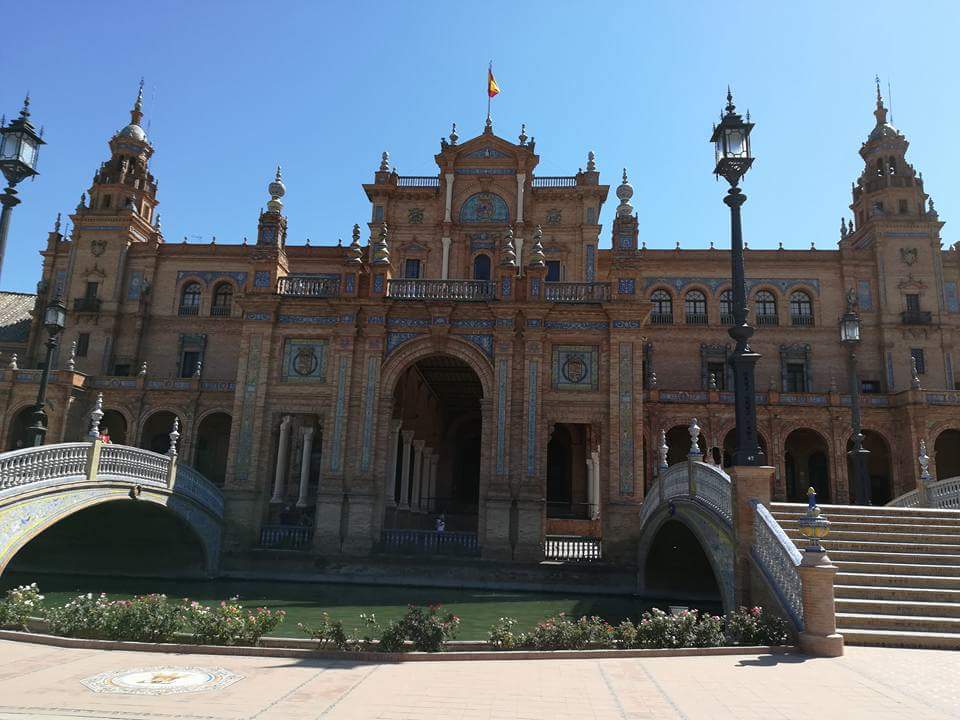
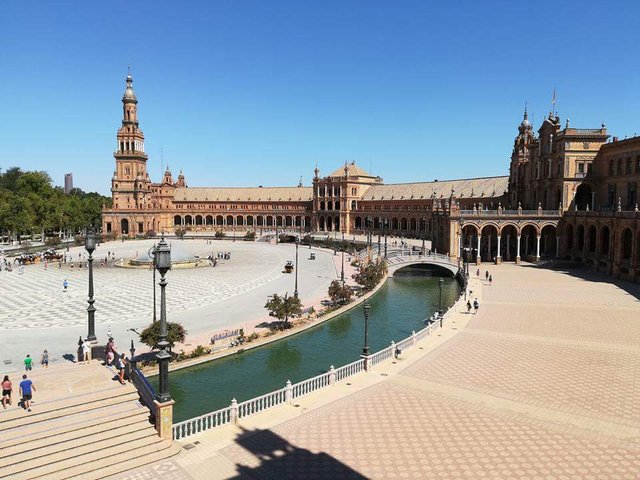
These are pictures from Plaza España, taken in my first trip to Sevilla
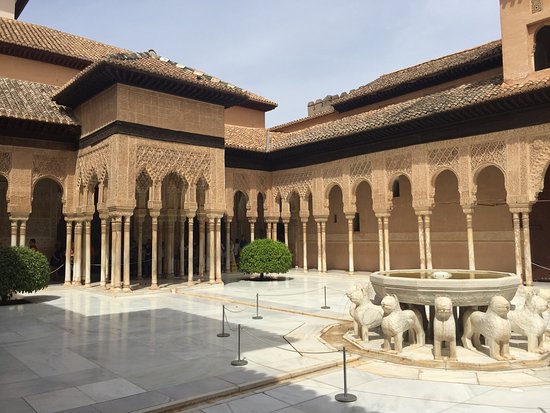 Source
Source
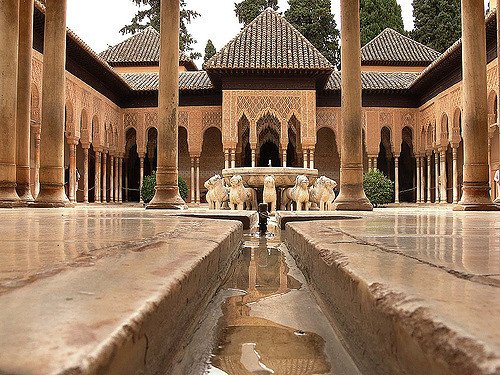
The amazing Alhambra
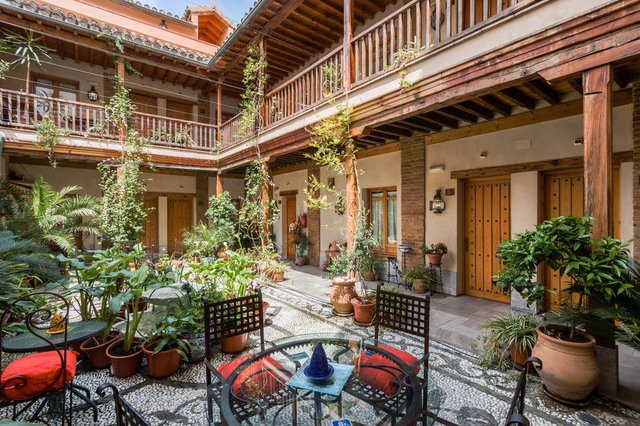
Spurce
And the Abadía Hotel in Granada, which is a key example of the Mudejar style, the interior patios surrounded by balconies and the joint use of wood and stone
- Formation of the Spanish empire
From 1479, Ferdinand II inherited the throne of Aragon after the death of his father and reigned with his wife Elizabeth I, sovereign of the Crown of Castile until 1504, the year she died.
At this time, the kings of Aragon ruled territories that consisted not only of the Kingdom of Aragon, but also of the Principality of Catalonia, and later of the Balearic Islands, the Kingdom of Valencia, Sicily, Naples and Sardinia. And so begins the conquering Spain
- Reign of Ferdinand II of Aragon and Isabel I of Castile
I have tried to summarize the legacy of his Communion mandate through a slide that summarizes the main measures and transformations that his reign left.

- Conclusions
With today's publication we have remembered a very important part of history, not so distant, that allowed us in a certain way to enrich knowledge and adopt new customs.
In addition this will be the preamble of my next publication that will give continuity, taking as starting point the beginning of the colonialist deployment of the Spanish crown.
Once again here I leave my questions, my suggestions, reflections or as you prefer to call them.
Who are we, where do we come from, are we so different from each other? So superior are we?
Let's observe the present being aware of our past and we will see how similar it is.
My regards to all.
Thank you always for your beautiful and useful comments
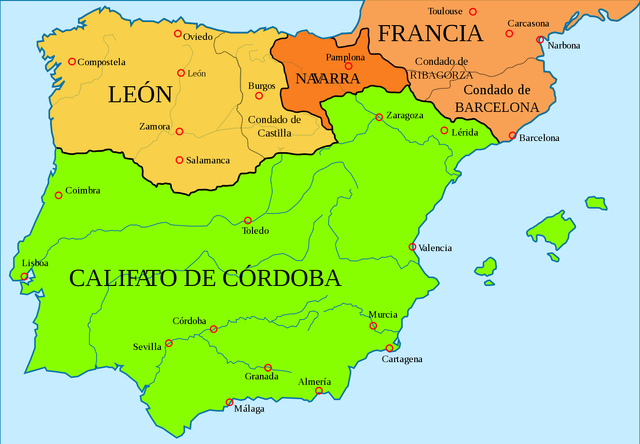
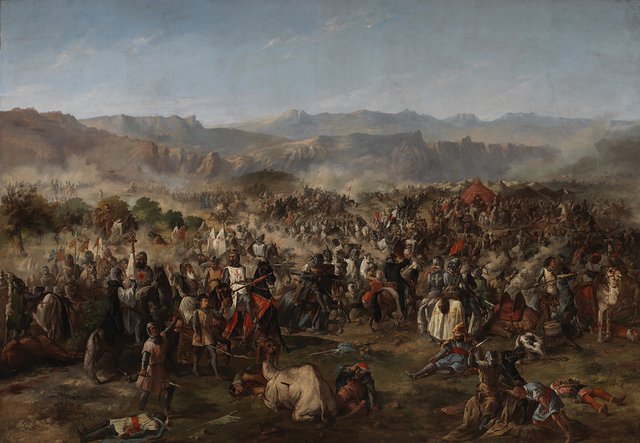
Upvoted! Very thought provoking I believe we human beings are more alike than we are different. If there were no religions, would there be causes for half of the wars in our vast history? Thanks for your post!
Downvoting a post can decrease pending rewards and make it less visible. Common reasons:
Submit
thnks
Downvoting a post can decrease pending rewards and make it less visible. Common reasons:
Submit
:)
Downvoting a post can decrease pending rewards and make it less visible. Common reasons:
Submit
History is always exciting! Thanks you)
And arabic architecture is Spain is great, not only in the southern part of the country, but on the Balearis islands, too)
Downvoting a post can decrease pending rewards and make it less visible. Common reasons:
Submit
Gezelim sıkıntı yok
Downvoting a post can decrease pending rewards and make it less visible. Common reasons:
Submit
I first heard about the expulsion of the 17th-century Spanish Muslims known as Moriscos back in 1992, when I was living in Barcelona.
Downvoting a post can decrease pending rewards and make it less visible. Common reasons:
Submit
beautiful pictures
now Spain will be my next tourist destination in 2018
Downvoting a post can decrease pending rewards and make it less visible. Common reasons:
Submit
@gracesunflower The earliest Muslim penetration in Spain during the Umayyad Caliphate. As Europeans still experienced the darkness of science, Muslims brought torches to illuminate Europe. Muslims became the saviors of the ancient Greek manuscripts. Translation is done on a large scale almost all branches of science. The Muslim presence became a lantern for Europeans at the end of the first millennium. Europeans are indebted to Muslims.
Downvoting a post can decrease pending rewards and make it less visible. Common reasons:
Submit